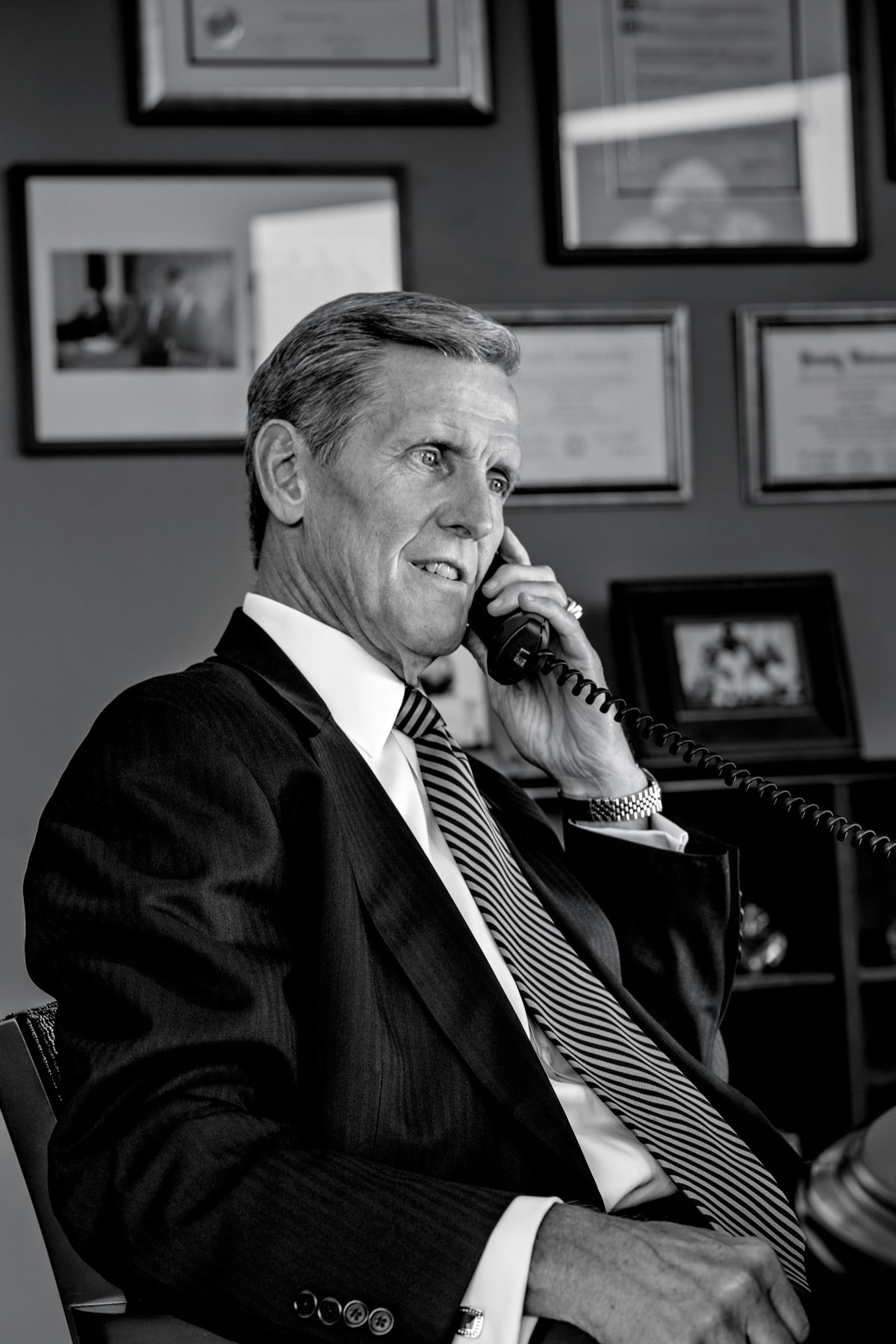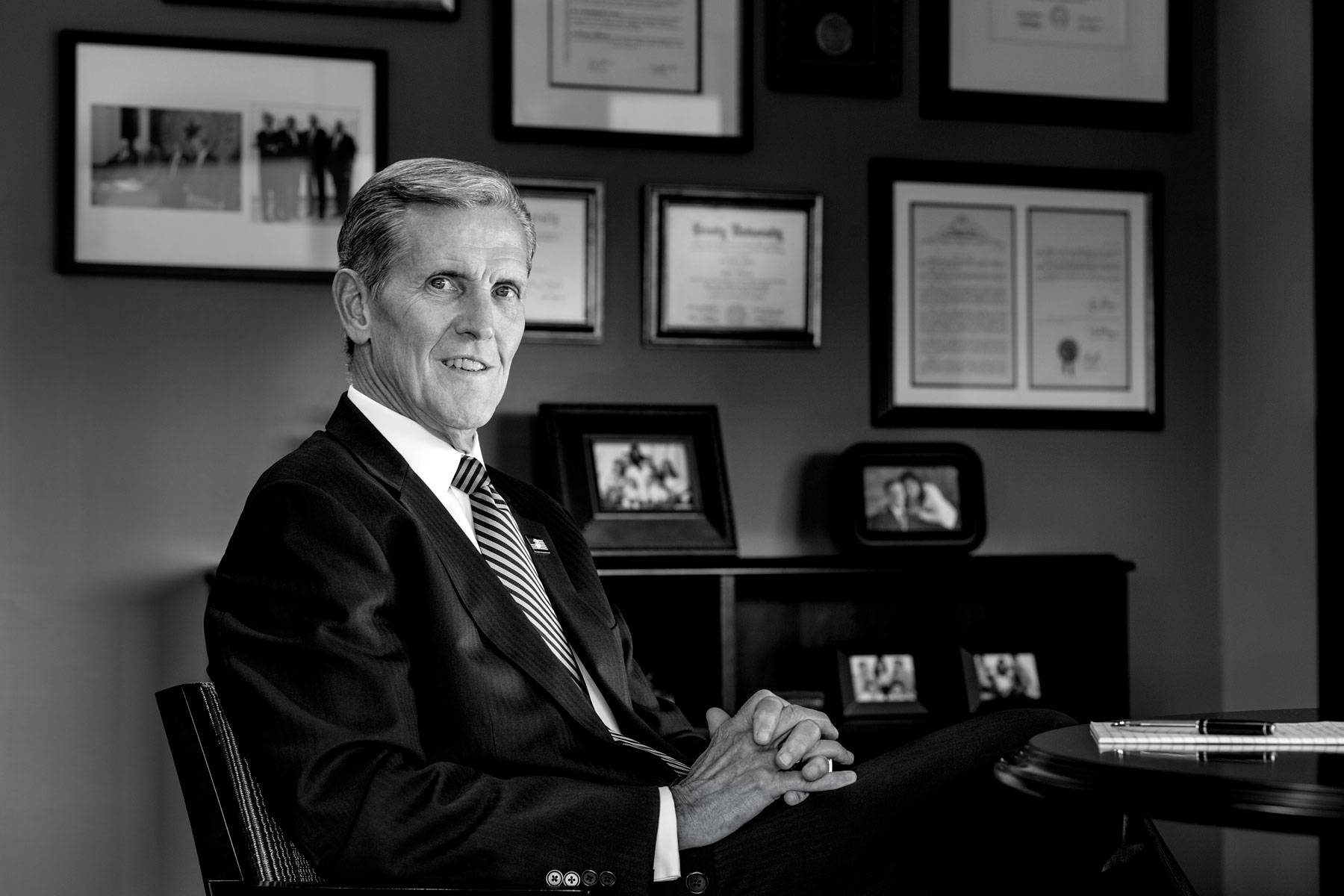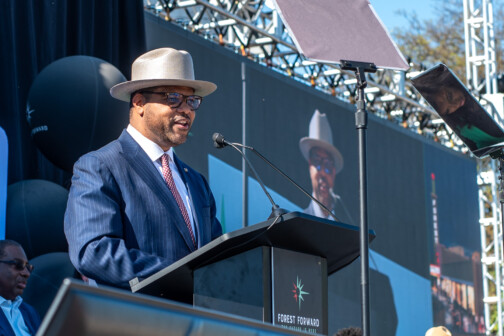HEALTHCARE AS A MINISTRY
Allison has been in healthcare administration for more than 40 years, but he didn’t step foot in a hospital until his senior year in high school. Not even when he was born; his mother gave birth to him in their rural Missouri home. That first hospital visit came after he was hit in the throat during a football game. The swollen larynx that followed awarded him his first view of the enterprise that would come to define his professional life.
He attended Baylor University in Waco on a football scholarship, pursuing degrees in journalism and religion. He was also a Marine reservist, receiving an honorable discharge in 1976. He says he felt “called to serve” once he reached Waco, but he wasn’t sure in what capacity until being assigned a photo essay for a journalism class. He followed his brother-in-law during his family health residency at John Peter Smith Hospital in Fort Worth. Allison remembers how dynamic the hospital was, how people were being helped 24 hours a day, seven days a week.
Allison planted the seed for the current flood of primary care clinics, urgent care clinics, and freestanding emergency departments.
Healthcare was it, but becoming a physician wasn’t of interest. His vision cleared up during a trip to a family medicine practice in Uvalde, where his brother-in-law was interviewing. They visited a new hospital in town and took Allison through the administrative offices. He met the new CEO, “a young guy” who told him that he felt called to serve and that healthcare administration is how he did it. “The light went off,” Allison says. “I never thought about the administrative side, I only thought about the clinical side.”
The Monday after he got back to Waco, he called the former Hillcrest Baptist Medical Center and asked to speak to Alton Pearson, then its CEO. Look around, Pearson said to him, the nonprofit health systems are all faith-based. “He said, ‘You know, this is my ministry, it’s a ministry of healing,’” Allison remembers. “It really began to register with me, maybe that’s where God’s leading me.”
He applied to Trinity University in San Antonio and received his master’s in healthcare administration in 1973. But in 1972 came an important stepping-stone: Allison and his wife, Diane, loaded the lone car they owned and headed west so he could serve an administrative residency at Abilene’s Hendrick Medical Center under one Boone Powell Jr., who would later become CEO of Baylor Health Care System.
“As we interviewed Joel, it was very clear to us that he carried the basic philosophical underpinnings that we thought important to running medical centers,” Powell says. “Even though he was just starting his training, we knew that he had the philosophy and the orientation and, we soon learned also, the qualities that we liked.” Chief among those qualities were Allison’s humility and his empathy with physicians, staff, and patients alike.
Powell hired him and Allison spent the next eight years ascending the ranks at Hendrick. In 1981, while serving as the hospital’s chief operating officer, he took a CEO position at Methodist Medical Center in St. Joseph, Missouri. This preceded a pair of top positions in Amarillo (in 1984) and Corpus Christi (1987). Powell, then the top executive at Baylor, called Allison home in 1993.
ENHANCING ACCESS TO QUALITY CARE
All this talk of recent mergers and physician integration and cost savings has a foundation in the past. Allison was Baylor’s chief operating officer and senior executive vice president until 2000 and, in 1994, planted the seed for the current flood of primary care clinics, urgent care clinics, and freestanding emergency departments.
He saw to the creation of the HealthTexas Provider Network, a Baylor subsidiary that now has more than 800 providers, about 650 physicians, and 148 advanced practice providers at about 250 care delivery sites throughout North Texas. All of them participate in the BSWQA.

HealthTexas “has really been instrumental in putting primary clinics across the community to increase patient access to high-quality patient care,” says Brock, the president and COO. “That’s huge.”
The 1990s also marked a change in American healthcare reimbursements. As HMOs and government programs like Medicare and Medicaid gained in popularity, hospitals found themselves limited on what they could charge for procedures and services. A culture of conglomeration, of banding together, became a prerogative for some nonprofit systems. Other systems allowed themselves to be swallowed by large for-profits to stay alive.
In 1996, Powell presented to the Baylor University Board of Regents—which, at the time, appointed Baylor Health’s board of trustees—a plan to merge with Harris Methodist Health System in Fort Worth and fellow Dallas-based Presbyterian Healthcare System. The merger never came to fruition; Harris Methodist and Presbyterian later joined with Arlington Memorial Hospital to create Texas Health Resources.
“I think it’s always timing, the environment,” Allison says. “The board was very much engaged, but the board felt maybe this isn’t the time. Maybe down the road, but right now [they said] we’re going through our own innovations and changes.”
Fast-forward to today: The healthcare environment is rife with many of the same challenges. Costs are unsustainable. Mergers and acquisitions are becoming more common, as systems look to share risks and boost gains.
“Healthcare is going through tremendous change, and consolidation is part of that change,” says Jim Turner, chair-elect of Baylor Scott & White Health’s board of trustees. “You’ve got to be larger in size and scale and geographic scope, and the cultures of the two organizations that you merge with are very important to its success.”
Turner was chairman of Baylor’s board when the system inked the merger with Scott & White. The merger talks began about three years ago, after a breakfast in Plano between Allison and Scott & White’s then-CEO Dr. Robert Pryor. The organizations were a good match. Their missions aligned, and there was no geographic overlap between their properties. The two men took the idea to their boards. Now, the Baylor Scott & White Health board is made up of eight board members from each organization. Allison refers to it as a “merger of equals.”
On June 3, 2014, Allison was back in Waco, about 6 miles northwest of his alma mater. The first hospital to don the Baylor Scott & White name would be Hillcrest Baptist Medical Center (now Baylor Scott & White Hillcrest Medical Center). It’s where, more than 40 years earlier, a young Baylor undergrad named Joel Allison cold-called its CEO, Alton Pearson. Healthcare was a ministry, Pearson told him. Allison hasn’t forgotten that.







